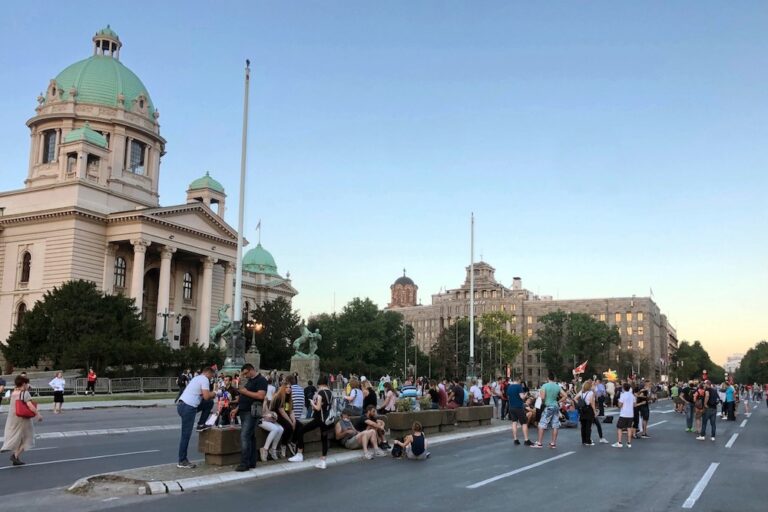(ARTICLE 19/IFEX) – ARTICLE 19 has condemned the Federal Yugoslav government’s use of military courts to try and to sentence Montenegrin journalists on criminal charges. It also appears that journalists from the independent media in Montenegro are being targeted by the authorities for call-up to the Yugoslav army. This has led to a number of […]
(ARTICLE 19/IFEX) – ARTICLE 19 has condemned the Federal Yugoslav
government’s use of military courts to try and to sentence Montenegrin
journalists on criminal charges. It also appears that journalists from the
independent media in Montenegro are being targeted by the authorities for
call-up to the Yugoslav army. This has led to a number of journalists going
into hiding.
**Updates IFEX alerts of 7 May and 29 April 1999**
Charges have been brought by a military court in Podgorica against two
journalists, Nebojsa Redzic, editor-in-chief of the independent radio
station Radio Free Montenegro, and Miodrag Perovic, founder of the weekly
magazine “Monitor” and the radio station Antenna M. Military police have
also attempted to issue a court summons to “Monitor” journalist Beba
Marusic.
The media outlets are refusing to accept court papers presented by military
police.
According to ARTICLE 19’s information, Redzic stands accused of broadcasting
news which reveals military positions, hence “weakening the army’s defence
power”, an offence under Article 118 of the Criminal Law of the Federal
Republic of Yugoslavia – apparently because of reports his station carried
about NATO bombings. He has not yet been tried and is in hiding.
In the case of Perovic, ARTICLE 19 understands that a military court has
ruled that he should be detained and then tried on charges of “violating the
integrity of the Federal Republic of Yugoslavia”, and the criminal act of
“interfering with the fight against the enemy” under Article 157 of the
Criminal Law. He too is in hiding. If found guilty, he faces a possible
prison sentence of up to five years. The charges apparently relate to
articles regarding the Yugoslav army’s “ethnic cleansing”/expulsion of its
own citizens from Kosovo, and suggesting that the Yugoslav military may be
provoking NATO attacks on Bar Harbour in Montenegro.
On 11 May, the military police went to the offices of “Monitor” with a
military court summons for Marusic. The reason for this summons is not known
but it is likely to be connected with articles she has written.
ARTICLE 19 is extremely concerned that these actions against the independent
media are intended, and will have the effect, of severely impeding even
further the free flow of information in Montenegro. Yet, it is precisely at
times of conflict that such a free flow of information is especially
crucial. As the Council of Europe noted in its 1996 Recommendation R(96)4 on
the Protection of Journalists in Situations of Conflict and Tension, “the
freedom of the media and the free and unhindered exercise of journalism must
be respected in situations of conflict and tension, since the right of
individuals and the general public to be informed about all matters of
public interest and to be able to evaluate the actions of public authorities
and other parties involved is especially important in such situations”.
In addition, the use of military courts constitutes a gross abuse of not
only the right to freedom of expression but also the fundamental right to
fair trial, a right which states are not permitted to derogate from even in
times of war or states of emergency. Journalists are civilians and as such
should be tried in civilian courts, not military courts.
The Montenegrin government officially does not consider itself at war,
although the Serbian-dominated Federal Republic authorities are acting as if
Montenegro is at war with NATO states. But, under the Geneva Conventions,
journalists must be treated as civilians even during times of war.
Commenting on this, a recent statement from the “Monitor”, broadcast over
Montenegrin TV, said that “only the Montenegrin civilian authorities and
courts are competent to say whether journalist[s]…[have] violated the laws
of the country. We demand protection from the Montenegrin civil authorities
and an end to the illegal persecution of journalists…It is clear that the
military authorities are trying to exert pressure and impose their own
laws.”
ARTICLE 19 has also received reports and is seeking further information
about other recent events which also threaten the functioning of the
independent media and the free flow of information. These include the
detention of foreign journalists on suspicion of spying, and attempts to
bring Montenegrin radio and television stations under military control.
ARTICLE 19 is extremely concerned that the above measures, together with the
targeting of independent journalists to be called up to the military causing
a number to go into hiding, means that the circulation of independent and
impartial information in Montenegro has been seriously restricted and that a
chilling effect may be exerted on the media. This is of particular concern
given the vulnerability of the political situation in this country and the
impact that any destabilisation of the Montenegrin government could have on
the region as a whole.


